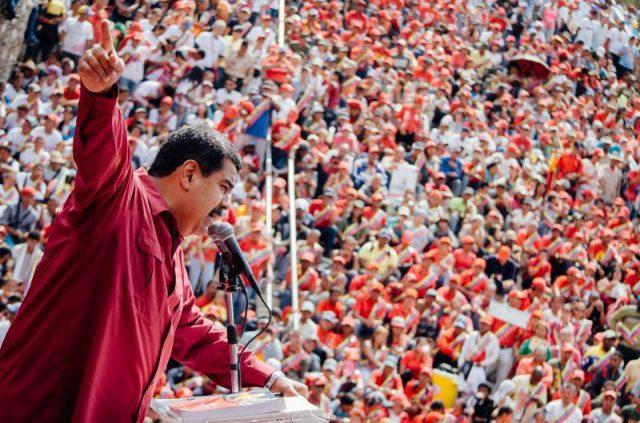
The world
Just days after Donald Trump impetuously cancelled the North Korea–US summit in Singapore, the meeting looks to be back on. After an impromptu summit between North and South Korea at the weekend, the White House announced that a ‘pre‑advance team’ will go to Singapore to prepare for a Trump–Kim meeting. Alex Ward from Vox takes a detailed look at how the historic summit between Washington and Pyongyang was reinstated as quickly as it was cancelled. Elizabeth Brown Kaiser evaluates the likelihood that the summit will succeed—spoiler alert: it’s not looking great.
Russia this week unveiled new military equipment for Arctic operations. This after Russia successfully tested the 200 metric–ton Sarmat ICBM that, according to Putin, can’t be intercepted and can strike anywhere in the world. The Center for Strategic and Budgetary Assessments provides advice on how to counter Russian coercion. Also, see last week’s piece by Steven Pifer for Brookings, which looks mainly at Russia’s threat to Ukraine, and the European Council on Foreign Affair’s paper about the war between Europe and Russia over international norms.
Papua New Guinea announced that it’ll block Facebook for a month in a bid to restrain the spread of fake news and hate speech. Foreign Policy and Brookings analyse how new technology, particularly AI, may drastically increase the volume of fake news on social media sites and the effects that this will have. Carnegie looks more specifically at Russia’s dissemination of fake news on social media sites and how Europe is responding.
Venezuelan President Nicolás Maduro remains in office despite a severe economic crisis, accusations of human rights violations and despotic leadership. Canada imposed sanctions on 14 of the country’s leaders in denouncing Venezuela’s last election as illegitimate and undemocratic. Brookings analyses the implications if new elections are held and Maduro secures another win, while The Atlantic explains the rationale behind Maduro’s obstinate hold on power.
In a great challenge to stereotypes, research from the World Economic Forum suggests that there has been a surge in women joining the workforce across the Muslim world in the past 15 years. According to the data, women outnumber men in STEM education in five Muslim countries, and working Muslim women’s combined earnings would make them the world’s 16th‑richest country. Lilia Abu-Lughod’s 2014 excellent book, Do Muslim women need saving?, explores the complexities of Muslim feminism from a postcolonial perspective.
Two interesting research pieces from Pew explore what unites and divides communities. The first analyses the attitudes of Europe’s Christian population. Although most adults in Western Europe identify as ‘non-practicing Christians’, they share churchgoing Christians’ suspicion of outsiders. The second explores the demographic shifts in the US and how they affect rural and urban communities in similar and different ways.
The UN’s Counter-Terrorism Committee Executive Directorate has just published its second Research Digest. This edition focuses on the crime–terror nexus. It includes a reading list with both long and short reads across a broad range of terrorist-related topics. Two really useful pieces: one on Ansarul Islam’s growing insurgency in Burkina Faso, and the other about the growing risk of extremism in the Balkans.
Tech geek
The reusable rocket revolution is blasting off! SpaceX is surging ahead following its recent Falcon 9 Block V launch, with another Falcon Heavy launch scheduled for June and the company’s ‘Big Falcon Rocket’—a more polite interpretation of the project’s ‘BFR’ codename—is scheduled to fly as early as next year. Industry experts argue that every three to five years, SpaceX adds a decade to its lead on competitors.
The US military is jumping aboard, and soon will be able to launch with SpaceX, and with Blue Origin, which aims to fly its New Glenn launch vehicle in 2020. Both Europe and China are getting in on the reusable rocket revolution. China is developing the reusable Long March 8, and the European Space Agency hopes to stage the first launch of its Callisto vehicle by 2020.
Like something straight out of Dr Evil in Austin Powers, the US military is developing a ‘Ghostswimmer’ drone that mimics the look and swimming style of a shark. The project is designed to explore the potential of biomimetic unmanned underwater vehicles to undertake intelligence, surveillance and reconnaissance tasks—and may even have lasers?
Israeli F‑35I ‘Adirs’ were used to attack Iranian targets in Syria, marking the aircraft’s global operational debut.
Finally, the US ‘uninvited’ China to this year’s RIMPAC naval exercises following China’s militarisation of disputed South China Sea islands. RIMPAC is a major naval exercise that occurs every two years. The 2016 exercise saw 26 nations and dozens of warships take part.
Podcasts
The Overseas Development Institute’s three-part series, Constructive Deconstruction, explores two years’ research on re‑imagining the humanitarian system. [Each episode around 40:00]
Policy Forum Pod speaks to Rory Medcalf, David Brewster and Denise Fisher about how the Indo-Pacific concept could shape the future of Asia. [1:30:00]
Videos
Charlie Winter discusses terrorist groups’ strategic communications objectives, focusing in particular on Islamic State’s objectives, themes and trajectory at an open meeting of the United Nations Counter-Terrorism Committee. [15:38]
Under the Blue Helmet:Life as a UN Peacekeeper in the Democratic Republic of the Congo shows the challenges faced by UN peacekeepers on a dangerous and rewarding MONUSCO mission. [12:50]
Events
Sydney, 5 June, 6–7.30 pm, The University of Sydney, ‘Sydney Ideas—The state of the universe’ presented by Professor Brian Schmidt. Free registration here.
Melbourne, 6 June, 6–7.00 pm, The University of Melbourne, ‘Australia’s protection of human rights: is a charter of rights a solution?’, presented by Professor Emeritus Gillian Triggs. Free registration here.
Canberra, 18 June, 4–5.30 pm, ANU’s Centre for European Studies hosts the Schuman Lecture: ‘EU–Australia: a global alliance for trade’, presented by European Commissioner for Trade Dr Celia Malmström. Free registration and details here.